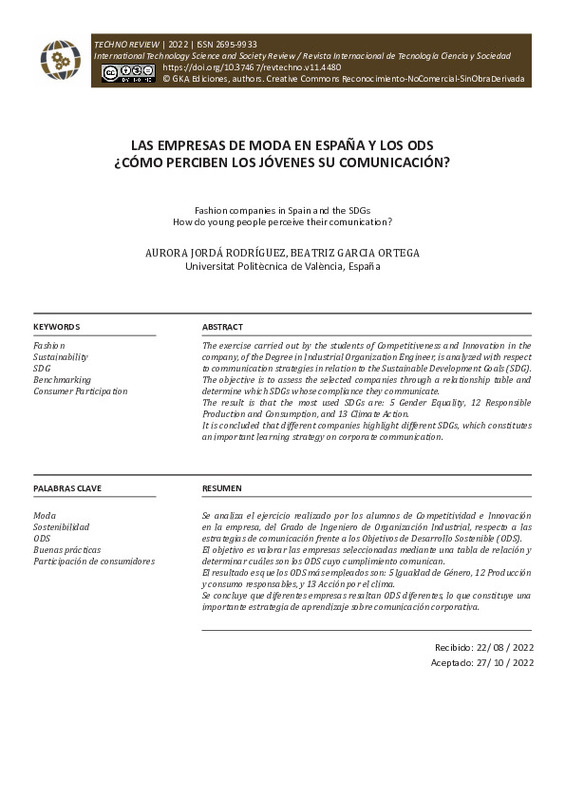ACCIÓ. (2020a). CATALUNYA CLÚSTERS. ACCIÓ Agència per la Competitivitat de l‘Empresa Generalitat de Catalunya. En: https://www.accio.gencat.cat/es/inici/index.html
ACCIÓ. (2020b). Identificació de reptes del sector de residus a Catalunya per desenvolupar una Iniciativa cluster. ACCIÓ Agència per la Competitivitat de l‘Empresa Generalitat de Catalunya. En: https://www.accio.gencat.cat/web/.content/01_Serveis/clusters/Troba-el-teu-cluster/doc/Analisi-Estrategica-Residus.pdf
Anguelov, N. (2016). The Dirty Side of the Garment Industry. Fast Fashion and Its Negative Impact on Environment and Society. CRC Press. Boca Raton, FL, USA.
[+]
ACCIÓ. (2020a). CATALUNYA CLÚSTERS. ACCIÓ Agència per la Competitivitat de l‘Empresa Generalitat de Catalunya. En: https://www.accio.gencat.cat/es/inici/index.html
ACCIÓ. (2020b). Identificació de reptes del sector de residus a Catalunya per desenvolupar una Iniciativa cluster. ACCIÓ Agència per la Competitivitat de l‘Empresa Generalitat de Catalunya. En: https://www.accio.gencat.cat/web/.content/01_Serveis/clusters/Troba-el-teu-cluster/doc/Analisi-Estrategica-Residus.pdf
Anguelov, N. (2016). The Dirty Side of the Garment Industry. Fast Fashion and Its Negative Impact on Environment and Society. CRC Press. Boca Raton, FL, USA.
Areskurrinaga Mirandona, E., Barrutia Etxebarria, X. & Martínez Tola, E. (2007). Regionalización y estrategias de localización en el sector textil y de la confección: el caso de la Unión Europea ampliada. Revista de Economía Mundial 16, 143-167.
CORRESPONSABLES. (2022). CORRESPONSABLES Nº 68 Edición especial Enero 2022. Revista CORRESPONSABLES. En: https://shelf.bhybrid.com/publication/1fefb198/mobile/?prc=7120220429
Franco, I. B. (Editor). (2022). Corporate Approaches to Sustainable Development. International Experiences and Insights. Springer Nature Singapore Pte Ltd.
Gardetti, M. A. & Muthu, S. S. (Editors). (2020). The UN Sustainable Development Goals for the Textile and Fashion Industry. Springer Nature Singapore Pte Ltd.
Gutmann, M. & Gorman, D. (Editors). (2022). Before the UN Sustainable Development Goals. A Historical Companion. Oxford University Press. Oxford, OX, United Kingdom.
Ifenthaler, D., Hofhues, S., Egloffstein, M. & Helbig, C. (Editors). (2021). Digital Transformation of Learning Organizations. Springer Nature Switzerland AG.
Jung, S., & Jin, B. (2014). A theoretical investigation of slow fashion: sustainable future of the apparel industry. International Journal of Consumer Studies. 38, 510-519. DOI: 10.1111/ijcs.12127
Jung, S., & Jin, B. (2016). From quantity to quality: understanding slow fashion consumers for sustainability and consumer education. International Journal of Consumer Studies. 40, 410-421. DOI: 10.1111/ijcs.12276
Kalicanin, D. & Gavric, O. (2014). The importance of clusters as drivers of competitive advantage of companies. Ekonomika Preduzeca. April 2014. DOI: 10.5937/ekopre1404164K.
Lorenzana Iglesias, O. (2018). La moda en España. Situación actual y cuestiones futuras. Distribución y Consumo 28 (153), pp 135-143. En: https://www.mercasa.es/media/publicaciones/243/1534086521_Moda_en_espana_DYC_153_150px.pdf
Machado, C. & Davim, J. P. (Editors). (2022). Sustainability and Intelligent Management. Management and Industrial Engineering Series. Springer Nature Switzerland AG.
McAteer, P. (2019). Sustainability Is the New Advantage. LEADERSHIP, CHANGE AND THE FUTURE OF BUSINESS. Anthem Press. An imprint of Wimbledon Publishing Company. London, UK.
McKinsey & Company. (2022). The State of Fashion 2022. McKinsey & Company and The Business of Fashion (BoF). New York, USA. En: https://www.mckinsey.com/~/media/mckinsey/industries/retail/our%20insights/state%20of%20fashion/2022/the-state-of-fashion-2022.pdf
Miozzo, M. & Walsh, V. (2006). International Competitiveness and Technological Change. Oxford University Press, Oxford, UK.
Modaes.es (2022). Shaking Sustainability in the fashion business 2022. Modaes.es En: https://www.modaes.com/files/publicaciones/free/2022/shaking_sustainability_2022/#page=1
Modaes.es con colaboración de Cityc y Moddo. (2021). Informe económico de la moda en España 2021. Ediciones Sibila. Barcelona. España. En: https://edicionessibila.com/wp-content/uploads/2021/11/pdf_informe_economico_2021.pdf
Muthu, S. S. (Editor). (2022). Sustainable Approaches in Textiles and Fashion. Consumerism, Global Textiles and Supply Chain. Springer Nature Singapore Pte Ltd.
O’Higgins, E. & Zsolnai, L. (Editors). (2018). Progressive Business Models: Creating Sustainable and Pro-Social Enterprise. (Palgrave Studies in Sustainable Business In Association with Future Earth). Palgrave Macmillan, Springer Nature, Springer International Publishing AG, Cham, Switzerland.
OIT (2014). Salarios y tiempo de trabajo en los sectores de los textiles, el vestido, el cuero y el calzado. OIT. Ginebra, Suiza. En: https://www.ilo.org/wcmsp5/groups/public/---ed_dialogue/---sector/documents/publication/wcms_300643.pdf
Oreszczyn, S. & Lane, A. (2017). Mapping Environmental Sustainability: Reflecting on Systemic Practices for Participatory Research. Policy Press, University of Bristol. Bristol, UK.
UNIDO. (2020). The UNIDO Approach to Cluster Development. KEY PRINCIPLES AND PROJECT EXPERIENCES. UNIDO - United Nations Industrial Development Organization. Ginebra, Suiza. En: https://www.unido.org/sites/default/files/files/2020-09/Clusters_Brochure.pdf
Weetman, C. (2021). A Circular Economy Handbook: How to Build a More Resilient, Competitive and Sustainable Business, 2nd Edition. Kogan Page. London, United Kingdom & New York, NY, USA & Daryaganj, New Delhi, India.
Yagoubi, A., & Tremblay, D-G. (2017). Cooperation and knowledge exchanges in creative careers: network support for fashion designers’careers. International Journal of Knowledge-Based Development, 8 (1), 24-46. DOI: 10.1504/IJKBD.2017.082430
Wagenaar, R. (2018). What Do We Know – What Should We Know? Measuring and Comparing Achievements of Learning in European Higher Education: Initiating the New CALOHEE Approach. In Zlatkin-Troitschanskaia, O., Toepper, M., Pant, H. A., Lautenbach, C. & Kuhn, C. (Editors). (2018).
Zlatkin-Troitschanskaia, O., Toepper, M., Pant, H. A., Lautenbach, C. & Kuhn, C. (Editors). (2018). Assessment of Learning Outcomes in Higher Education. Cross-National Comparisons and Perspectives. Springer International Publishing AG, part of Springer Nature.
[-]









